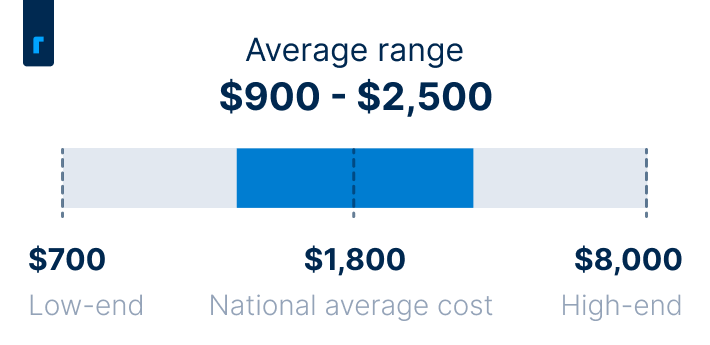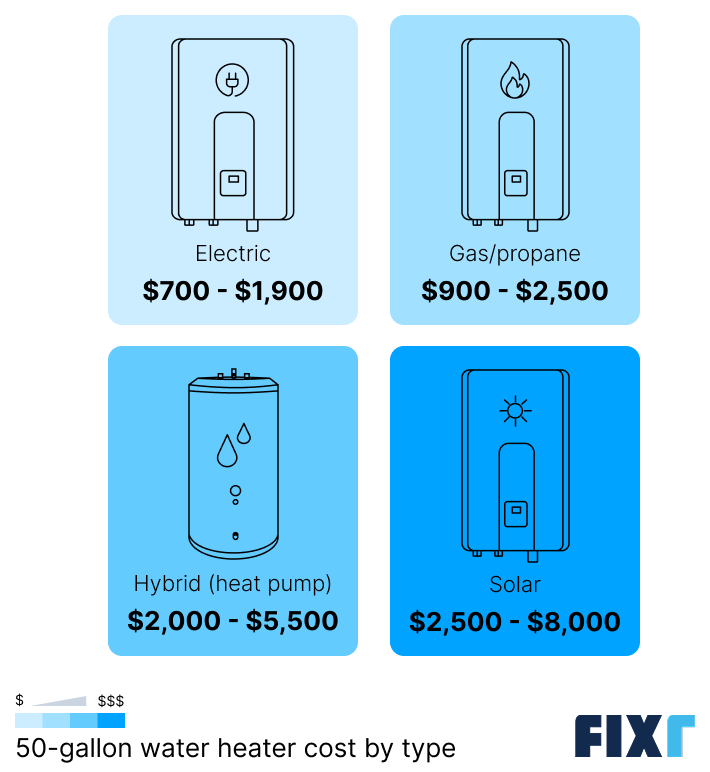Updated: January 26, 2026
Written by Laura Madrigal
Nieves Martinez is a writer and editor at Fixr.com, specializing in home improvement and construction content. With over five years of experience and a Master's degree in Digital Marketing, she collaborates with industry professionals to create clear, carefully reviewed cost guides and renovation resources that help homeowners make informed remodeling decisions.
Learn moreReviewed by Nieves Martinez
The national average cost to install a 50-gallon water heater is $900 to $2,500, with most homeowners paying around $1,800 for a standard natural gas, high-efficiency 50-gallon unit.
A 50-gallon water heater is a popular size for medium to large households, providing enough hot water for families of 3 to 5 people. The final price you pay to install a 50-gallon water heater will vary significantly based on the unit’s fuel type, the complexity of the installation, and the need for any code upgrades or modifications
Average Cost of 50-Gallon Water Heater Installation


This guide focuses specifically on 50-gallon models. For a complete overview of installation costs for all sizes and types, including tankless units, read our water heater installation cost guide.
Cost to Install a 50-Gallon Water Heater by Type
The fuel source you choose for your water heater is the most important factor in determining both the upfront 50-gallon water heater installation cost and the long-term annual operating expenses. A 50-gallon tank provides plenty of hot water for a household of 3 to 5 people, but the unit type dictates the final installed price.
Electric: Standard electric water heaters are the least expensive to purchase and install, often making them a popular budget choice. They use electric resistance coils to heat water, which results in them being the most costly to operate over the unit's lifespan due to higher energy consumption.
Gas and propane: These models have a moderate-to-high upfront cost compared to standard electric units, but they typically offer lower monthly energy bills. Gas and propane water heaters require a gas line and must be properly vented to the outside, which can increase the complexity and cost of the installation.
Hybrid (heat pump): A hybrid heat pump water heater represents a highly efficient technology. They have a high initial installation cost but capture heat from the surrounding air, using up to 70% less energy than standard electric models, which translates to significant long-term savings.
Solar: Solar water heaters require the highest upfront investment due to the cost of the solar panels and the complex installation of the entire system. However, they boast the highest efficiency ratings and the lowest possible operating costs, as they use free energy from the sun. They still require a gas or electric backup system for times when solar power is insufficient.


Type | Installed Cost |
$700 – $1,900 | |
$900 – $2,500 | |
Hybrid (Heat Pump) | $2,000 – $5,500 |
$2,500 – $8,000 |
Key Cost Factors
The overall cost to install a 50-gallon water heater is the sum of the unit cost, labor, and additional expenses for modifications or upgrades.
Labor: Professional installation is essential for safety, code compliance, and performance. Labor accounts for roughly 20% to 50% of the total price, typically ranging from $180 to $1,250. Plumbers usually charge $45 to $200 per hour, with a standard replacement taking 2 to 4 hours. Complex jobs involving new plumbing lines, venting, or relocation will require more time and increase the final labor cost.
Brand and quality: Water heaters from top brands like Rheem, Bradford White, and A.O. Smith are available in multiple quality tiers. Choosing a model with premium components, heavier insulation, and a longer warranty will result in a higher material cost compared to builder-grade units.
Venting: Propane and gas water heaters require specialized venting systems to move exhaust safely outside. If your existing venting is inadequate or if you are installing a new gas line, installing a direct-vent or power-vent system can be expensive, potentially adding $3,400 to $10,200 to the project. Electric and hybrid models do not require venting.
Permits and Inspections: Most municipalities require a permit for water heater installation to ensure compliance with local safety codes. The cost for permits and a post-installation inspection can range from $25 to $1,500.
Energy efficiency: The Uniform Energy Factor (UEF) measures a unit's energy efficiency. Higher UEF models cost more upfront but result in lower utility bills over time. Energy Star-certified models are the most efficient and may qualify for local or federal rebates, which can help offset the higher purchase price.
Additional Considerations and Costs
Several other factors can impact the final 50-gallon water heater replacement cost beyond the unit and basic labor.
Expansion tank: In homes with a closed-loop water system, an expansion tank is often required to protect the plumbing from pressure fluctuations caused by heating water. Installation of an expansion tank adds an average of $150 to $400 to the total cost.
Old tank disposal: A plumber will typically haul away and properly dispose of your old water heater, a service that generally costs between $50 and $150.
Code upgrades: If your home's existing plumbing, electrical wiring, or gas line does not meet current building codes, your installer will be required to make upgrades. These mandatory fixes can add several hundred dollars to the final bill.
Warranty: Standard warranties on tank-style water heaters last between 6 and 10 years. You can purchase an extended warranty for added peace of mind, though this will increase the initial purchase price.
Annual Operating Costs
When considering the total cost of ownership, remember that the long-term operating costs can have a greater financial impact than the upfront purchase and installation price.
An electric model is the most expensive to run, costing approximately $600 to $750 annually due to the high cost of electricity for resistance heating.
Gas heaters are more economical, with estimated annual operating costs ranging from $325 to $475, thanks to the generally lower price of natural gas compared to electricity.
Hybrid models offer the greatest efficiency, costing only $225 to $350 annually by pulling heat from the air.
Solar heaters are the cheapest to run, costing an estimated $100 to $250 per year for the minimal electricity used by the pump and backup system.
Your actual operating expenses will fluctuate based on your household's water usage, local climate, and current utility rates.
DIY vs. Professional Installation
Installing or replacing a 50-gallon water heater is not a recommended DIY project. The job includes managing critical utilities like natural gas lines, high-voltage electricity, and high-pressure plumbing. Attempting a DIY installation can lead to severe safety hazards like gas leaks, carbon monoxide poisoning, or electrical fires, and most manufacturers will void the product warranty if a certified, licensed professional does not perform the installation. For your safety, for proper code compliance, and to ensure the unit functions correctly, always hire a licensed and insured plumber or HVAC professional.
FAQs
The cost for a good, professionally installed 50-gallon water heater, which typically includes a unit with a 9- to 12-year warranty and high efficiency, falls within the average range of $900 to $2,500.
For a family of 3 to 5 with typical water usage, a 50-gallon tank is generally sufficient. You may need to consider a larger 60-gallon tank or a high-flow tankless system if you have a large soaking tub, multiple high-flow showerheads, or frequently use multiple hot water appliances simultaneously.
Most tank-style water heaters have a lifespan of 10 to 15 years. You can extend the unit's life by scheduling regular maintenance, such as having the tank flushed annually to prevent sediment buildup.
A 50-gallon tank provides more usable warm water because the output is mixed with cold water. Assuming a standard shower flow, you can expect approximately 50 to 60 minutes of continuous warm water.
A standard 50-gallon hot water tank typically measures between 20 and 22 inches in diameter and stands 50 to 60 inches tall, though these dimensions vary based on the unit's configuration. "Tall" models are the most common for basements or utility rooms, while "Short" or "Lowboy" models are wider—often reaching 24 to 26 inches—to maintain the same capacity in cramped spaces like crawlspaces.
